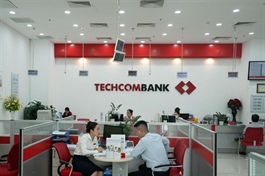Stock market optimistic ahead of potential upgrade
Stock market optimistic ahead of potential upgrade
Capital flows in the Vietnamese stock market are seen as gaining internal strength, driven by a series of positive policy changes this year, despite prolonged foreign sell-offs pushing ownership levels to historic lows.
Foreign ownership has fallen to its lowest level since 2015 as exchange-traded funds (ETFs) maintained their net selling position in the first month of 2025, with a total outflow of $25.7 million, marking the fifteenth consecutive month of capital withdrawal from Vietnam.
Dinh Quang Hinh, head of Macroeconomics and Market Strategy Department of VNDirect Securities Corporation, noted that the stock market is supported by positive domestic factors, particularly the continued expansionary monetary policy in 2025, which is expected to have a favourable impact on asset channels, including equities.
“Macroeconomic data for January, released by the General Statistics Office on February 6, indicates a promising start for Vietnam’s economy in 2025. Despite the long holiday break, index of industrial production and public investment execution still posted positive on-year growth, even with fewer working days.”
According to Hinh, economic growth has gained momentum right from the beginning of the year, rather than being sluggish due to post-holiday sentiment as in previous years. This environment is improving investor sentiment domestically.
“As foreign investors continue their net selling and domestic capital remains insufficient to drive the market on its own, the market will likely consolidate at this level for some time before gathering enough momentum and supportive factors to break through strong resistance levels,” he added.
In the global investment flow update report released by SSI Securities on February 10, experts forecast that capital inflows from investment funds into Vietnam will continue to face mixed influences this year.
“Capital flows will be constrained by expectations of the US Federal Reserve’s slow rate-cutting pace, exchange rate pressures, unpredictable US policies, economic recession risks, and the limited number of stocks in sectors attracting global capital, such as technology,” the report stated. “On a positive note, the decline in foreign ownership to its lowest level since 2015 could limit further capital outflows.”
SSI report also expressed optimism about the potential return of foreign investors to Vietnam in 2025, driven by the country’s anticipated upgrade to emerging market status by FTSE Russell.
“It is important to note that key preparatory policies, such as the implementation of the KRX trading system and the amendments to the Securities Law, will provide a foundation for the long-term development of Vietnam’s capital market,” said an SSI representative.
Notably, the Ho Chi Minh Stock Exchange has introduced a 4.0 index, replacing version 3.1 and effective from March. The move introduces three key changes: higher trading volume and value criteria to enhance liquidity for selected stocks, financial requirements ensuring no negative net profit to improve stock quality, and a 40 per cent cap on sectoral weightings within the VN30 Index to maintain industry balance.
Nguyen The Minh, head of Research and Development for Retail Clients at Yuanta Securities Vietnam, highlighted that the new framework, particularly for the VN30 Index, incorporates enhanced liquidity criteria for both trading volume and value.
“Globally, liquidity is a key factor in index formation and a critical criterion for ETFs. Enhancing liquidity will attract more investor interest in index-based portfolios, making them more appealing to foreign investors.” “Raising liquidity requirements also addresses a common issue in Vietnam’s stock market, where some large-cap stocks have low trading liquidity, causing indices to misrepresent actual market trends.”
“For VN30, the revised criteria improve the portfolio’s overall quality, reducing fundamental risks for less experienced individual investors who rely on index-based investments,” added Minh.
In its capital market report published on February 11, HSBC Global Research explored Vietnam’s potential upgrade to emerging market status and the expansion of its capital-raising channels. HSBC emphasised Vietnam’s nascent capital market, noting that the country’s stock market was Southeast Asia’s best performer in 2024. However, recent quarters have seen a decline in foreign investment flows.
“Nonetheless, changes are underway. Vietnam officially removed the pre-funding requirement for securities trading in November, meeting a key criterion for its potential reclassification from a frontier to an emerging market, which could materialise by year-end. FTSE Russell estimates that an upgrade could pull in around $6 billion in foreign investment, equivalent to over 1 per cent of Vietnam’s GDP,” the report stated.
According to HSBC, this is particularly significant for Vietnam, which trails its ASEAN peers in stock market development.
“The government has taken steps to address market risks and challenges. After the turbulence in the corporate bond market at the end of 2022, regulators introduced various safeguards to reassure investors, such as limiting private corporate bond trading to professional investors,” noted the report.
























